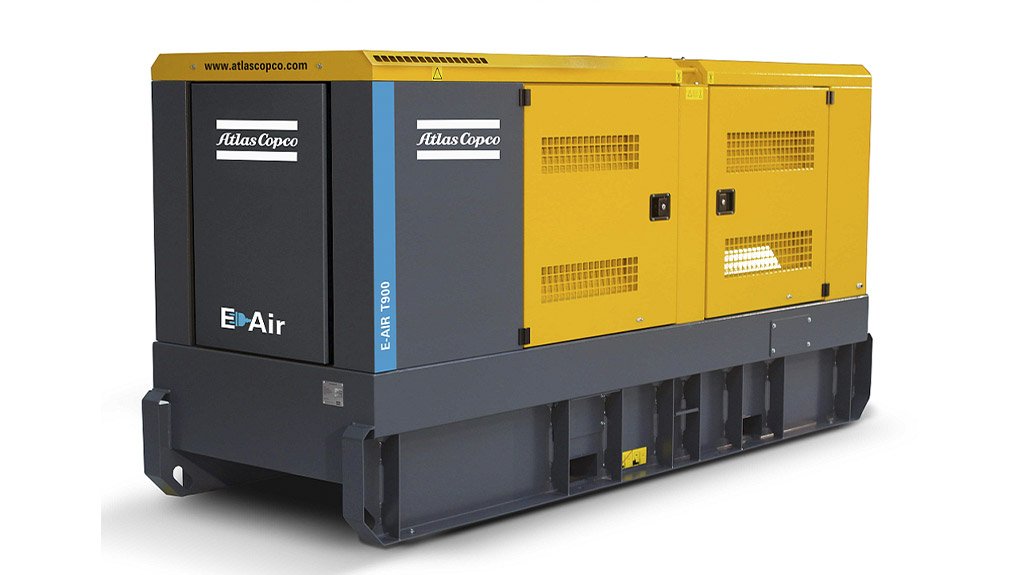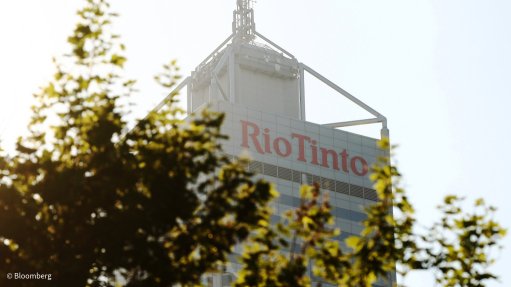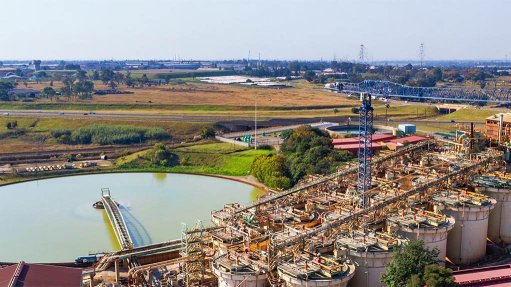Mobile e-air compressor suitable for niche markets


ATLAS COPCO E-AIR COMPRESSOR The e-air range delivers compressed air with a flow of 3 m3/min to 37 m3/min, with its running costs reduced by up to 50% when compared with diesel alternatives
Given global demand for carbon-neutral products, industrial equipment manufacturer Atlas Copco Industrial Southern Africa is increasing its range of electric equipment, such as its mobile e-air compressor, says business line manager David Stanford.
Atlas Copco’s range of e-air compressors differ from conventional electrical air components in that they are mobile, robust and compact.
The e-air range delivers compressed air with a flow of 3 m3/min to 37 m3/min, with its running costs reduced by up to 50%, when compared with diesel alternatives, he says.
The most sophisticated products in the e-air compressor range have a wide voltage supply of 380 V with ±15% deviation – they are also best for use in unpredictable weather and can withstand temperatures ranging from -25 °C to 46 °C.
Stanford emphasises that Atlas Copco’s e-air compressors have a lower cost of ownership than conventional electric compressors. They are also made for environments that are less stable and less predictable.
The e-air compressors’ most beneficial feature is mobility. Yet with mobility and robustness, there is the inevitable compromise on efficiency when compared with stationary, conventional electric compressors, he points out.
The defining difference between diesel and electric compressors is that, when using an electric component, there is an extreme reduction in carbon emissions and less noise, as well as an improvement on total cost of ownership and compactness.
While Atlas Copco’s European customers are demanding carbon-neutral products, this is not entirely feasible in Southern Africa yet, Stanford explains.
“There is still a need for diesel-driven technologies and compressors, which are used at remote mining sites, owing to most remote operations not having access to an electricity outlet or the on-site microgeneration of power.”
Consequently, the local market is currently not ready for a full migration towards electric technologies powered by renewables, considering the state of the economy and its current industrial position, he adds.
Further, for the e-air compressor to function, power is required from one’s utility, whether it be renewable energy or power provided by State-owned power utility Eskom. Standford acknowledges that, from a sustainability and carbon-neutral perspective, the product is somewhat “nonsensical” if it is powered by coal-fired electricity.
“The biggest challenge on the electrical side is actually changing industry habits and pushing for better policy regulation.”
Stanford adds that Atlas Copco takes its impact on the environment seriously – it has built the United Nations Sustainable Development Goals into its strategy and is set on implementing key performance indicators within each of its divisions.
Atlas Copco’s diesel compressors are still the most efficient and sustainable on the market, he adds.
“As innovators, we plan to make our technologies cleaner and more accessible. We do foresee that our product range, over time, will move away from diesel to more electric- or battery-driven and more sustainable type of power sources,” he points out.
Industries that particularly benefit from a mobile unit, such as the e-air compressor, are underground mining, fish farming and breweries, besides others. These sectors will look to use electrical compressors that can be moved around, such as the e-air compressor, he emphasises.
The e-air compressors are also available for rent, owing to the financial uncertainty in South Africa, Stanford concludes.
Article Enquiry
Email Article
Save Article
Feedback
To advertise email advertising@creamermedia.co.za or click here
Announcements
What's On
Subscribe to improve your user experience...
Option 1 (equivalent of R125 a month):
Receive a weekly copy of Creamer Media's Engineering News & Mining Weekly magazine
(print copy for those in South Africa and e-magazine for those outside of South Africa)
Receive daily email newsletters
Access to full search results
Access archive of magazine back copies
Access to Projects in Progress
Access to ONE Research Report of your choice in PDF format
Option 2 (equivalent of R375 a month):
All benefits from Option 1
PLUS
Access to Creamer Media's Research Channel Africa for ALL Research Reports, in PDF format, on various industrial and mining sectors
including Electricity; Water; Energy Transition; Hydrogen; Roads, Rail and Ports; Coal; Gold; Platinum; Battery Metals; etc.
Already a subscriber?
Forgotten your password?
Receive weekly copy of Creamer Media's Engineering News & Mining Weekly magazine (print copy for those in South Africa and e-magazine for those outside of South Africa)
➕
Recieve daily email newsletters
➕
Access to full search results
➕
Access archive of magazine back copies
➕
Access to Projects in Progress
➕
Access to ONE Research Report of your choice in PDF format
RESEARCH CHANNEL AFRICA
R4500 (equivalent of R375 a month)
SUBSCRIBEAll benefits from Option 1
➕
Access to Creamer Media's Research Channel Africa for ALL Research Reports on various industrial and mining sectors, in PDF format, including on:
Electricity
➕
Water
➕
Energy Transition
➕
Hydrogen
➕
Roads, Rail and Ports
➕
Coal
➕
Gold
➕
Platinum
➕
Battery Metals
➕
etc.
Receive all benefits from Option 1 or Option 2 delivered to numerous people at your company
➕
Multiple User names and Passwords for simultaneous log-ins
➕
Intranet integration access to all in your organisation



















